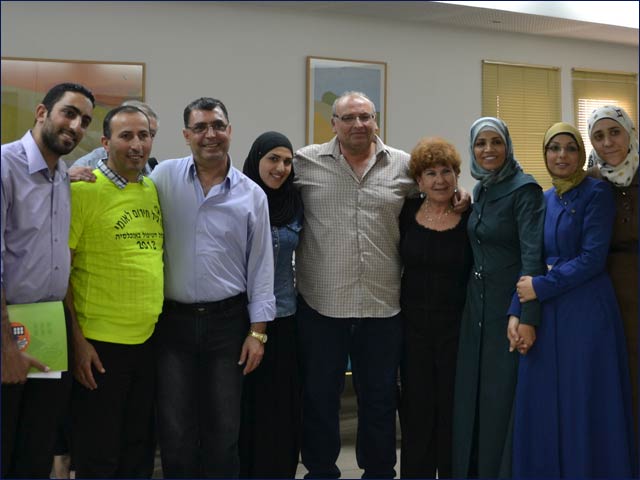By Rivka Borochov
The Bedouin community is a bit different from other minority groups in Israel. They practice Islam like the majority of the country’s Arab Israelis and keep their own nomadic traditions.
While they harbor a long-held belief that Gaza terrorists will not target them when firing Kassams and Grads into Israel, Bedouins nevertheless bleed when hit with shrapnel. And at least one Negev Bedouin has been killed by Gaza-fired missiles, which after all know no borders.
Sarit Ziv, manager of the southern region of the Israel Trauma Coalition (ITC), helped organize a training course for Negev Bedouin social workers so they can better prepare their communities for catastrophe. ITC is an umbrella organization that oversees 40 NGOs dealing with crisis and emergency situations in Israel.
Graduation ceremony of the nine-month course, which gives social workers tools to help their own community.
Ziv, an Israeli Jew, has spent a lot of time on the ground learning about the special challenges that the Bedouins in southern Israel face. During the worst times of rocket fire from Gaza, some Bedouin communities heard missile warning sirens rip through their communities up to five times a day.
Yet even when Bedouin towns and cities like Rahat are told by their mayors to shut down, life just goes on as usual.
Ziv recalls being at the Rahat market on a day when the mayor declared it closed. There were even administrators out telling all the shop owners to go home.
Astonishingly, she says, she was the only one who ran for cover under the specially constructed shelters for missile attacks. The rest of the marketplace continued on with business.
With God’s help
The lack of preparedness in the Bedouin community may come from a few factors: a belief that Kassams and Grads can be accurately launched at specific Jewish Israeli villages and towns; a lack of education in general about the disasters that face them; and some very specific cultural challenges, says Ziv.
The basic cultural premise one must understand is that Israel’s Bedouins believe everything comes from God. “They believe that if they die, they die; and if they live, they live. Allah will decide,” Ziv says.
“In a way it is like that in Judaism too, so we worked with the social workers to help them understand that, although this is the right way to think –– that everything is from Allah, or from the heavens –– we need to help ourselves first, that that’s what God would want.”
Faith traditions from Islam helped the coalition access and communicate with the Bedouins in their own language.
Helping the kids
Since 2009, the Israeli Bedouin community has been under threat of missile attack from nearby Gaza, sometimes daily. While most Israelis in the region know what to do when a missile siren is heard, the Bedouin community has no similar awareness.
Just being exposed to the noise of the sirens and the fear of a missile landing is harmful to children now and well into the future. “The Bedouin parents are not aware of the problem and the effect it has on their kids,” says Ziv.
“Research shows that if you deal with trauma early enough you can stop more people from developing a severe post-traumatic stress syndrome situation,” she says.
Ziv has seen cases of bedwetting, Bedouin kids not able to sleep, and the same kids not being able to separate from their parents, out of fear. “We want to give the community tools so that the kids can deal with their fears from the start.”
The course was taught to 25 Bedouin social workers over nine months, ending in March 2014. The social workers went out into the field, worked with local leaders and mayors, and developed emergency training specific to their population.
Certainly the model could be replicated in other Arab communities, using the basic understanding that learning has to come from local traditions, from the bottom up, says Ziv.
“The Arabs in Israel’s north are a very different community from the Arab Bedouins in the south,” says Ziv.
The same is true for Bedouins in Jordan, Sinai or other Arab countries, but the social workers course dealing with emergency preparedness for terror, bus accidents, chemical exposure or natural disasters is definitely something that Israeli experts could transfer to other regions and cultures in the region, she believes.
“We can take the cultural tools and together build a course that suits the culture.”
This particular course was developed by Israel’s Homefront Command, the Ministry of Social Affairs and social workers from Bedouin society.

Trainers and social workers at the end of the courseThe 25 trained social workers are ready to work in their communities with their new skills. In the future they will take further courses on how to deal with emergencies.